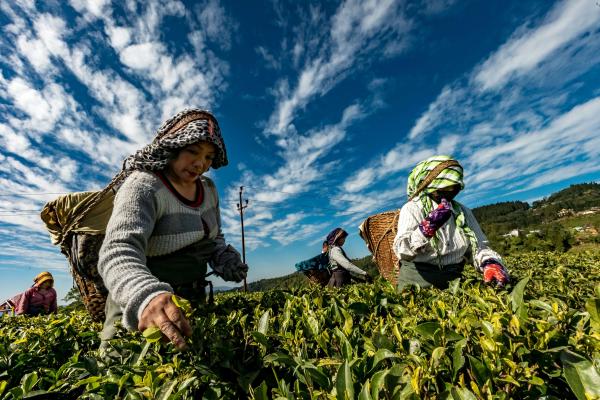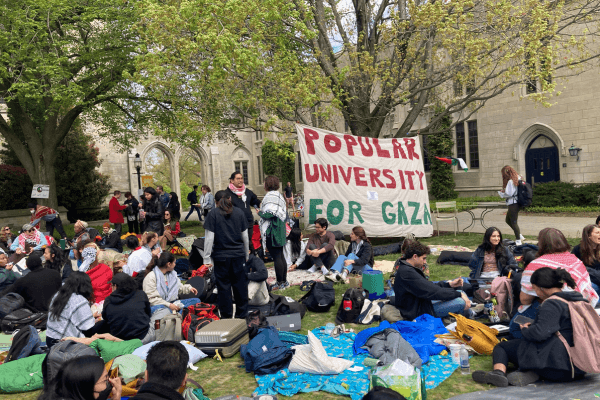Women are our very first environment. This is the traditional teaching of Indigenous women: that they carry, nurture, grow, and sustain life within their bodies. Women as life-givers understand intimately the relationship between body, environment, movement, and our place in the world.
"Women carry our clans and ... by carrying our clans, are the ones that hold that land for the next generation,” shares Iako’tsira:reh Amanda Lickers from Turtle Clan in Seneca in Violence on the Land, Violence on our Bodies.
Today, a quarter of all economically active women are also involved in agriculture. In fact, in places like rural Kenya, where subsistence farming is the main vocation, women do more farming than men. Lenders have even confirmed that women are more responsible holders of property deeds and that microfinance works more effectively and provides more for the whole community when provided to women. Yet women still face severe inequalities in access to land and credit: Though women produce the majority of the world’s food, they own only less than 20 percent of the world’s titled land.
I saw this stark divide in regions of rural Uganda; even though women were the primary small-scale farmers and providers for the household, shares and finances were primarily owned and exchanged by men via the church-organized village savings loan associations (VSLA). And the men in those associations spoke the loudest and longest.
Women in half the world are still denied land ownership, and a quarter of developing countries have laws that even impede women from owning property. If women had the support they needed from neighboring associations, they could feed their whole family and have enough to spare for the market, adding to the local economy and investing in community prosperity.
"When we include women in climate solutions, we see enhanced economic growth and the outcomes are more sustainable," UN Climate Change Executive Secretary Patricia Espinosa said.
Climate and environmental justice solutions today are entrenched in patriarchal norms. Women are earth harvesters, life givers, and protectors. The evidence is clear that when women are empowered, they empower the world and the earth reaps benefits. Yet the health impacts of climate change are particularly acute for women in the form of pervasive, yet nearly undetectable, environmental violence — from their disproportionate exposure to dirty solid fuels for household use, to the unimaginable amount of sexual violence that Indigenous women face due to the parasitic fossil fuel industry extracting and profiting off of the natural resources on their native land.
Nearly 85 percent of Native women have experienced gender-based violence in their lifetimes; 86 percent of the time, the perpetrator is non-Native. The existence of “man camps” working in big oil, coal, and gas in Indigenous territories has drastically increased sexual assault rates. The current epidemic of missing and murdered Indigenous women in Canada is considered a national crisis, and comparable rates in the U.S. suggest the need for the same level of attention. Environmental violence borne on the bodies of these women manifests in infertility, birth defects, and the mental and physical ramifications that always accompany violence.
Environmental violence on women presents itself as a major reproductive health issue, but it doesn’t stop there. Women’s bodies absorb an accumulated toxicity from the gathering and usage of dirty solid fuels like charcoal, agricultural residues, and coal used most often for cooking in developing countries. Women bear disproportionate amounts of exposure to these chemicals and inhale toxic fumes of dirty fuels used for cooking on an everyday basis. Industries that continue to profit off of dirty biomass without considering cleaner, more sustainable alternatives like solar are not only doing indirect violence on the bodies and health of millions of women in these countries, but are also tinkering with forests to make way for producing dirty fuels. This violent extraction runs a scar through the variegated natural landscape, wiping biodiversity from the region.
When women are included at the decision-making table for climate, they offer practical alternatives born from the wisdom of their lived experience. Often, their ideas are both sustainable and gender-responsive, like the need to invest in cleaner cook stoves that run on renewable solar energies. Just as Jesus has always gone out of his way to listen to, center, and empower those most ostracized by societal norms, we must do better to center and empower women who are the most impacted by climate policy and environmental crises.
The newly created UN Gender Action Plan for climate change is a great first step. It calls for increasing the knowledge and capacity of women as first responders to climate change through workshops and information exchange, pursuing full and meaningful participation of women in national delegations. We must hold leaders accountable, ensuring that this great plan is meaningfully executed. And we must listen to women, pay attention to on-the-ground solutions they are already creating, and earnestly follow that leadership at all levels of environmental decision-making.
Gender equality must become a priority in the execution of the global Sustainable Development Goals. Women and girls must be involved in the creation and implementation of climate policy.
It is time to overturn the patriarchal model of production and extraction that has wreaked havoc on people and the planet since the industrial revolution. We must invest in and accelerate the healing work of women all over the world who have been leading on the front lines of climate change and environmental disaster for generations. Only then will we unlearn damaging patriarchal narratives on environmental justice and uncover new paradigms of environmental healing that center the practice of community-care, the concept of consent for land and body, tending the earth as spiritual practice, and celebration of tradition and ceremony as ways to enlarge our being.
"Women resist because they defend life," Guatemalan activist Sandra Moran has written. "The extractive model kills life, impedes it, transforms it. The defense of life is in the center of resistance and as women we have always been at the center of taking care of life."
Reportage from Kenya and Uganda co-sponsored by World Renew and the CRC Climate Witness Project.
Got something to say about what you're reading? We value your feedback!







